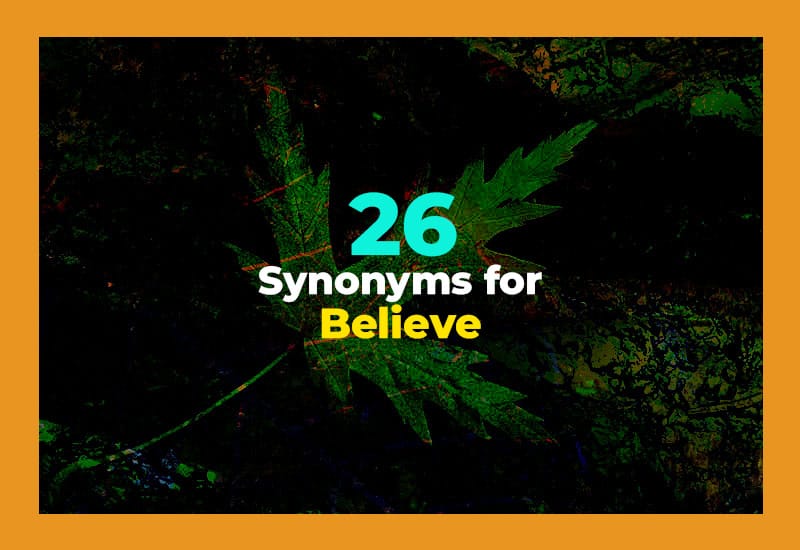You probably use the word believe a lot without thinking much about it. But there are so many fun and easy ways to say it! Whether you want to say you trust, hope, or even assume something, this list will give you cool new words to try. It's like having a bigger toolbox for your thoughts.
1. Accept
To accept means to agree with something as true or real without arguing. When you accept an idea, you don't question it anymore. For example, I accept that the sun rises in the east. This word shows you are open to understanding or agreeing. Sometimes, people accept facts even if they are hard to believe at first. Like when you accept a new rule at school, it means you follow it without complaining. So, to accept is to give in your trust or approval quietly and calmly.
2. Trust
To trust means you feel sure that someone or something will do what is right or good. When you trust a friend, you believe they will keep your secret. For example, I trust my sister to help me with my homework. Trust is important because it builds strong friendships and relationships. If you trust someone, you feel safe and confident with them. You don't doubt or worry. Trust is a deep kind of believe, where your heart feels calm because you know the other person will not let you down.
3. Think
To think something means you have an idea or opinion in your mind. When you say, I think it will rain today, you are guessing based on what you see or feel. Thinking is not as strong as knowing, but it shows your mind is working. Sometimes, people think differently because they see things from their own view. Saying you think something can also mean you believe it's true, but you're not 100% sure. It's like having a feeling or thought about what might happen or what is real.
4. Suppose
To suppose means you imagine or believe something is true for now, often without full proof. When you say, I suppose she is at home, you mean it's likely but you're not sure. People use suppose when they want to make a guess or a polite opinion. It's softer than saying you know for sure. You suppose things when you don't want to be too direct or when you are unsure. This word helps you share your idea while leaving space for other possibilities.
5. Assume
To assume means to believe something without checking or proof. For example, I assume the store is open because it's daytime. Sometimes, we assume things based on what seems normal or likely. But assumptions can be wrong, so it's good to be careful. When you assume, you fill in the blanks in your mind. People do this all the time to make quick decisions. But it's better to ask or check when you can, so your assumptions don't lead to mistakes.
6. Feel
To feel means you believe something based on your emotions or senses, not just facts. For example, I feel he is telling the truth. Feel is a softer way to say believe because it comes from inside you, not just logic. Sometimes your heart or gut tells you what to believe before your mind does. Saying you feel something can show kindness or hope. It helps you share what you think without sounding too sure or firm.
7. Consider
To consider means to think about something carefully before deciding if it is true or important. For example, I consider her a good friend means you think about her qualities and decide she is nice. When you consider, you give attention and respect to ideas or people. It shows you don't judge too fast. This word is useful when you want to explain you are open-minded and thoughtful before making up your mind.
8. Judge
To judge means to form an opinion about something or someone. For example, I judge that the movie will be fun to watch. Judging is a way to believe something after thinking about the facts or feelings. Sometimes, judging can be unfair if done too quickly, but it's part of how we decide what we believe. It's like being a small judge in your own mind, choosing what seems right or true based on what you know.
9. Hope
To hope means you want to believe something good will happen, even if you don't know for sure. For example, I hope we get a sunny day for the picnic. Hope is a happy kind of believe that makes you feel positive. It helps you look forward to something nice. Even if things seem hard, hope keeps your spirit alive. When you say you hope, you show you care and want the best outcome.
10. Rely
To rely means you believe you can depend on someone or something. For example, I rely on my alarm clock to wake me up. When you rely on something, you trust it will work or be there for you. It's a strong way to say believe because it shows action — you count on it every day. Relying helps you feel safe and sure about the people or things in your life.
11. Credit
To credit means to believe that someone deserves praise or recognition. For example, I credit her for finishing the project on time. It means you think their work or words are true and important. Crediting someone shows respect for their effort or honesty. When you credit, you give value to what they did or said. It's a way to believe and honor someone's truth or success.
12. Expect
To expect means you believe something will happen soon or in the future. For example, I expect the bus to arrive at 8 o'clock. Expecting shows you are sure about a plan or result. It is a stronger kind of believe that looks forward. People expect things when they think they are normal or likely. Expecting helps you prepare for what is coming, and it shows confidence in your beliefs.
13. Presume
To presume means to believe something is true based on what seems logical, without checking fully. For example, I presume she is busy because she didn't answer the phone. Presuming is like making a smart guess. It's close to assuming but often sounds more official. People presume to move forward with plans or decisions without needing all the details. It shows a practical kind of belief.
14. Deem
To deem means to officially believe or decide something is true or important. For example, The teacher deemed the test easy for the class. Deeming is often used in serious or formal situations. When you deem, you give your opinion with confidence. It shows you have thought carefully and made a clear judgment. Deem is a strong word for believe, often seen in rules, laws, or formal talks.
15. Imagine
To imagine means to believe or think about something in your mind, often something not real yet. For example, I imagine winning the game feels great. Imagining helps you believe in dreams or ideas before they happen. It's a creative kind of believe where your mind plays with possibilities. People imagine to hope, plan, or dream about good things in the future.
16. Hold
To hold a belief means to keep it in your mind strongly. For example, I hold the opinion that honesty is very important. Holding a belief shows you keep it close and don't change it easily. It's like holding a treasure in your hands. People hold beliefs for a long time, and it shapes who they are. Holding is a quiet but firm way to show you believe in something.
17. Count on
To count on someone or something means to believe they will be there when you need them. For example, I count on my best friend to help me. Counting on is a friendly and trusting way to say believe. It shows you are confident and sure. People count on others when they feel safe and supported. It's a warm and personal kind of believe.
18. Swallow
To swallow an idea means to believe it fully, even if it is hard to accept. For example, He swallowed the news that he lost the game. Swallowing can show you accept something difficult or surprising. It means you stop doubting and just take it in. This word is often used when the belief is a bit tough or shocking but you still accept it.
19. Buy
To buy an idea means to believe it easily or quickly. For example, I didn't buy his excuse because it didn't make sense. Buying something in this way means you accept it without much question. People can buy good or bad ideas. Saying you buy something shows if you trust it or not. It's a casual and modern way to say believe.
20. Conclude
To conclude means to believe something after thinking about all the facts or information. For example, After reading the book, I conclude it was very interesting. Concluding shows you have made a decision based on evidence. It's like finishing a puzzle and seeing the whole picture. When you conclude, you believe because you have proof or strong reasons. This word is often used in studies or serious talks.
21. Gather
To gather means to believe something from clues or hints you have noticed. For example, I gather that she is tired because she is quiet today. Gathering is like collecting small pieces of information to form a belief. It's a gentle and thoughtful way to say you think something is true. People gather ideas slowly and carefully before they decide what to believe.
22. Reckon
To reckon means to believe or think something, often used in casual talk. For example, I reckon we'll get there by noon. Reckoning is a friendly and informal way to share your opinion or guess. It's popular in some regions and shows you believe based on your experience or feeling. It's a simple and everyday way to say believe or think.
23. Opine
To opine means to give your opinion or belief about something, usually politely or formally. For example, The expert opined that the plan would work. Opining is sharing your belief in a clear way, often when asked. It shows you have thought about it and are ready to explain. This word is often used in writing or serious talks.
24. Affirm
To affirm means to strongly say you believe something is true. For example, I affirm that we will finish the work on time. Affirming shows confidence and certainty. It's a positive way to say believe, often used in speeches or promises. When you affirm, you make your belief clear and firm for others to hear and trust.
25. Accept as true
To accept as true means you believe something without doubt. For example, I accept as true that the earth orbits the sun. This phrase shows full trust and no questioning. When you accept as true, you agree completely with the fact or idea. It's a formal way to say believe, often used in science or official talks.
26. Have faith in
To have faith in means to strongly believe in someone or something, often without proof. For example, I have faith in my team to win the game. Having faith is a deep and emotional kind of believe. It means you trust with your heart, even if you cannot see the result yet. People have faith in friends, ideas, or dreams that they hold dear.

Final Thoughts
Believing is something we do every day in many ways. Whether it's trusting a friend, hoping for good news, or simply thinking something might happen, each word adds color to how we share our thoughts. Using different synonyms for believe helps you express your feelings clearly and in fun ways. Try these words in your talks or writing, and you might find new ways to connect with others. Remember, belief is powerful, and now you have many words to show it!









